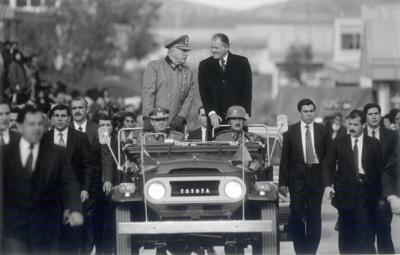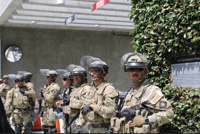
From left: Augusto Pinochet Ugarte and Former Chilean president Patricio Aylwin. Pinochet ruled Chile from 1973 to 1990. (Wikimedia Commons)
In October 1937, the Dominican Republic's border was stained with blood as more than 17,000 Haitians were brutally slaughtered along Rio Dajabón—now called the Massacre River. Under orders from Dominican dictator Rafael Leónidas Trujillo Molina (1891- 1961), the military carried out a ruthless campaign to exterminate Haitian immigrants in the border region. This horrific act remains a chilling testament to the brutality of one of Latin America's most ruthless dictators of the 20th century.
As I began a deep analysis of Latin American dictatorships, I found a clear and disturbing pattern: nationalism, media suppression, political persecution and attacks on the judiciary have been the foundation for both the rise and entrenchment of these authoritarian regimes.
The Haitian massacre was a brutal manifestation of ethnic conflict and deep-rooted racism. Trujillo, alongside the Dominican elite, fostered a nationalist and cultural identity that promoted hatred against immigrants, many of whom labored on sugar plantations near the border. As a dictator, Trujillo sought to assert the legitimacy of his power, using violence to reinforce his control.
Violence against the most vulnerable—immigrants, indigenous communities and the poor—has been a hallmark of Latin American dictatorships. On March 14, 1978, under the brutal regime of Jorge Rafael Videla (1925-2013), at least 65 common and political prisoners were massacred in Buenos Aires, Argentina. The Federal Penitentiary Service orchestrated this atrocity, known as La Masacre del Pabellón Séptimo. While Videla’s dictatorship carried out systematic human rights abuses, Argentina hosted the 1978 World Cup. As the people celebrated the World Cup triumph in June, the regime kept much of the population blind to its crimes. Just as dictatorships silence dissent through violence, they control the narrative by buying media influence and controlling narratives.
The effectiveness of a dictatorship is to control, censor or eliminate media outlets, such as television, radio or newspapers that criticize them and to replace them with political propaganda. In 2007, Hugo Chávez (1954-2013) labeled Globovisión, Venezuela's most influential news outlet, “the enemy of the state." Two years later, in an apparent act of intimidation, armed pro-government militants stormed the station's offices. By 2013, under mounting pressure, Globovision was forced to change ownership and transform into another mouthpiece for the government. Under Nicolás Maduro (1962), the crackdown on press freedom continued, proving once again that in a dictatorship, journalism and truth are the first casualty.
Back in the 1970s, one of the most infamous cases was that of American journalist Charles Horman(1942-1973), who was executed shortly after Pinochet's 1973 coup against the democratically elected President Salvador Allende (1908-1973). Augusto Pinochet's dictatorship was among the bloodiest in Latin America, and at least 36 were murdered for their criticism against the government, their voices silenced to shield the brutal reality of his rule. The legislative branch was dissolved, and the judiciary remained under the scrutiny of General Pinochet (1915-2006).
When authoritarian regimes seize control of the judiciary, they don’t just undermine the legal system—they dismantle democracy itself. Dictators manipulate courts, dissolve independent oversight and rewrite constitutions to secure absolute power. In Nicaragua, President Daniel Ortega (1945-) took this strategy to its extreme. In 2024, he proposed a constitutional amendment to re-establish a single-party system and cement his authoritarian rule. On February 19, 2025, his reform was passed, erasing any semblance of checks and balances. Now, power rests entirely in the hands of Ortega and his wife, co-president Rosario Murillo, turning Nicaragua into a dictatorship.
Authoritarians do not just seize power—they rewrite the rules to keep it. In El Salvador, Nayib Bukele (1981-) secured a court ruling in 2021 allowing immediate presidential reelection, dismantling a key democratic safeguard. This strategy is not new. Leaders like Chávez in Venezuela have used the same tactics, taking control of electoral bodies to manipulate outcomes in their favor. In 2009, Chávez placed the National Electoral Council under his grip, paving the way for Maduro’s dubious victories and extending his dictatorship. These authoritarian regimes seek to extend their rule by changing laws to simulate legitimate elections. They begin questioning the electoral body, the voters and even the voting methods to secure reelection.
The manipulation of both branches of government is an opportunity to make constitutional changes, as Bukele did in El Salvador. In 2021, the Constitutional Chamber of the Supreme Court of El Salvador ruled, allowing the country's presidents to run for immediate reelection. By attacking judicial independence, discrediting electoral institutions and undermining voters themselves, autocrats like Bukele and Maduro chip away at democracy until nothing remains but their own unchecked rule.
The way these authoritarian regimes have achieved dictatorial power is by eradicating the media, sidelining critical journalists, seizing government institutions and Congress, questioning the judicial system, weakening this branch of government and delegitimizing electoral systems by questioning voting methods.
Looking at these regimes, it became clear that silencing dissent and weakening democratic institutions were their most powerful tools for maintaining control. History offers a stark reminder that when leaders prioritize their power over democratic principles, fundamental freedoms can disappear far more quickly than we might expect. Understanding these patterns isn’t just an academic exercise; it’s a warning we should take seriously to protect democracy before it’s too late.











(0) comments
Welcome to the discussion.
Log In
Keep it Clean. Please avoid obscene, vulgar, lewd, racist or sexually-oriented language.
PLEASE TURN OFF YOUR CAPS LOCK.
Don't Threaten. Threats of harming another person will not be tolerated.
Be Truthful. Don't knowingly lie about anyone or anything.
Be Nice. No racism, sexism or any sort of -ism that is degrading to another person.
Be Proactive. Use the 'Report' link on each comment to let us know of abusive posts.
Share with Us. We'd love to hear eyewitness accounts, the history behind an article.